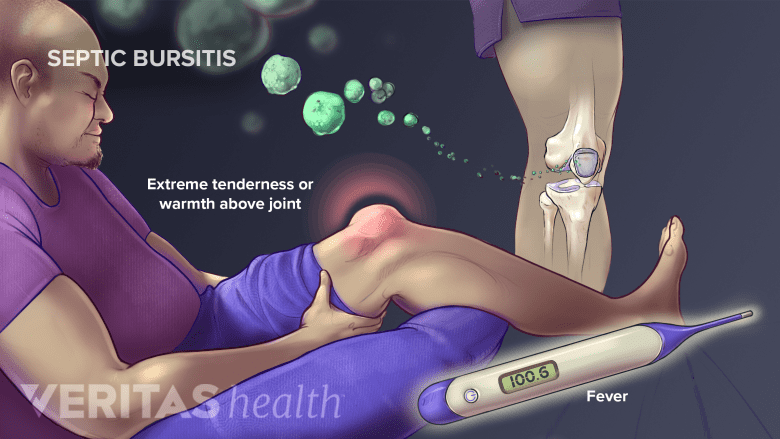This article describes 12 common causes of knee swelling. Causes 7 through 12 are listed and described below. Causes 1 through 6 are listed on the previous page of this article.
In This Article:
- What Causes a Swollen Knee (Water on the Knee)?
- More Causes of a Swollen Knee (Water on the Knee)
7. Baker's cyst
Swelling at the back of the knee may indicate a Baker's cyst. The cyst may have no other symptoms or may be accompanied by pain and stiffness. The pain may get worse during certain activities, such as straightening or bending the knee or after standing for a long time.
A Baker’s cyst occurs when a bursa located at the back of the knee, called the popliteal bursa, fills with excess fluid. Another name for a Baker’s cyst is a popliteal cyst. While this condition may resolve on its own with home treatments, some people may want to go to a doctor to have the fluid drained.
8. Juvenile rheumatoid arthritis
Aching, swollen joints may cause a child to limp or seem clumsy and could be a sign of juvenile rheumatoid arthritis. The aching pain may be most noticeable in the morning, when joints are stiff. Juvenile rheumatoid arthritis often affects big joints, including the knee, and may affect more than one joint at a time.
Children with juvenile rheumatoid arthritis may also experience a fever or rash. Caregivers should contact a doctor if a child's symptoms persist for a week or more.
See Juvenile Idiopathic Arthritis and Other Rheumatologic Diseases in Children
9. Osgood-Schlatter disease
Most common in active tweens and teens, Osgood-Schlatter disease is an inflammation of the patellar tendon in the knee. This condition can cause the knee to become swollen and painful. In addition, the very top of the shinbone (at the bottom of the knee) may be pronounced and the skin over this area may be tender to touch. The child may report tightness at the front or back of the thigh.
The diagnostic process may include getting an X-ray. After diagnosis, this condition can usually be treated at home and will resolve as the child grows.
10. Septic arthritis

Septic bursitis is a serious condition that requires immediate medical attention.
Bacteria or other microorganisms can penetrate the delicate lining that surrounds the knee joint, infecting the joint and potentially causing it to fill with pus. Knee swelling accompanied by intense knee pain and fever can be a sign of septic arthritis. Symptoms may develop quickly, over hours or days.
If the underlying infection spreads to the bloodstream, it can be life-threatening. Patients should seek medical attention immediately if they suspect symptoms are caused by septic arthritis.
See How Infection Can Lead to Severe Knee Pain
11. Reactive arthritis (including Reiter's syndrome)
Certain types of bacterial infections (e.g. Chlamydia and gastrointestinal infections) can spur an inflammatory immune response in the body that may cause pain and swelling in joints.
See Infections that Can Cause Reactive Arthritis
Sometimes reactive arthritis symptoms resolve on their own or with over-the-counter anti-inflammatory medications; however, serious or chronic cases require medical attention.
See How Doctors Treat Reactive Arthritis
12. Tumor
While relatively uncommon, a benign or malignant tumor can cause a swollen knee. The swelling may be accompanied by pain that feels achy and dull. The pain may be more noticeable at night or when starting to exercise or increase activity. A tumor may also be accompanied by fever, weight loss, and night sweats.
Getting a Diagnosis
When left untreated, chronic or long-standing knee swelling can lead to tissue damage, so getting an accurate diagnosis and medical treatment is advised.
Aspiration

Joint aspiration is the process of removing fluid from the joint with a needle.
To diagnose the cause of knee swelling a doctor will use the process of elimination, ruling out different diagnoses until the correct one is identified. To do this, the doctor may want to draw fluid from the swollen joint capsule or bursa. This process is called aspiration. Aspirating a swollen joint (arthrocentesis) or bursa can help relieve discomfort, and analysis of the fluid may help diagnose the cause of knee swelling.
See The Joint Aspiration Procedure
The doctor may also order imaging studies, such as X-rays or an MRI, and blood tests.
Seeking Urgent Care
Below are guidelines to help people decide if their knee swelling requires urgent medical attention. If the person is still unsure whether to seek professional medical treatment, a phone call to a doctor or nurse can help determine whether an office visit is necessary.
- The knee is severely swollen or has a pronounced abnormality
- The knee cannot fully straighten or fully bend
- The knee is severely painful (for example, the pain is not adequately treated with over-the-counter medication)
- The person cannot bear weight on the knee or feels as if the knee is going to give out
- The skin over the knee turns hot or red
- The person has a fever of 100.4° F or higher
- Knee swelling has been present for 3 days or longer
Swelling accompanied by sharp pain, swelling, or redness in the calf, or the feeling of water running down the calf can be signs of a blood clot or other grave medical condition that requires immediate medical attention.

